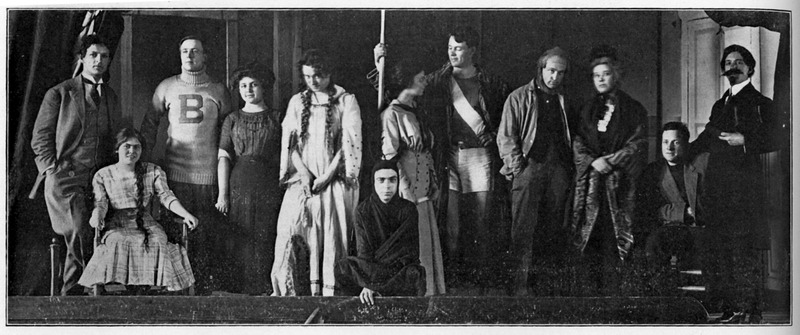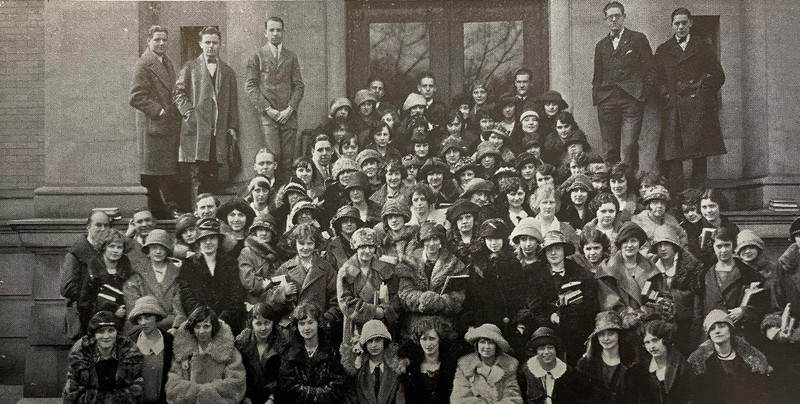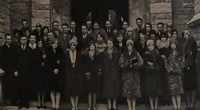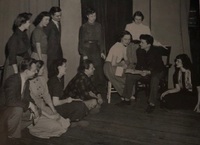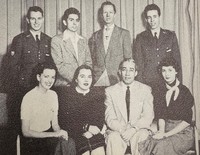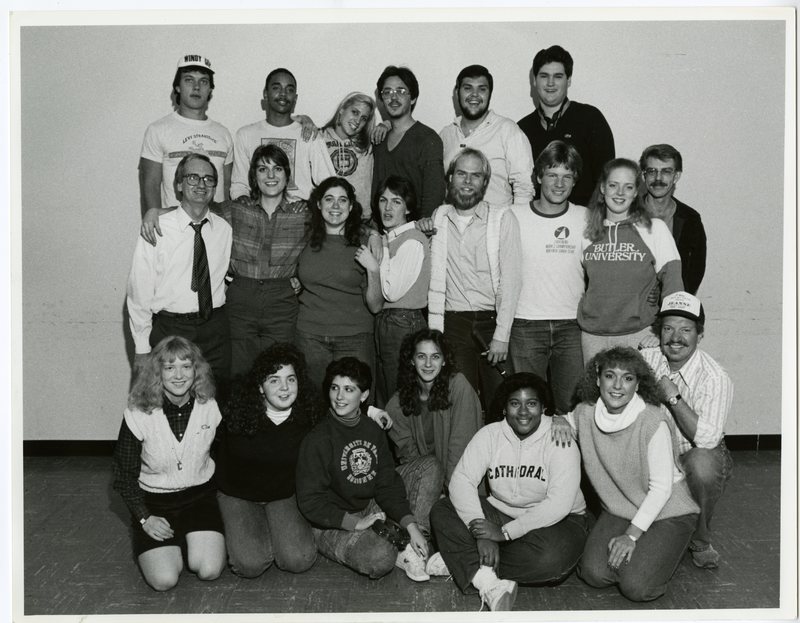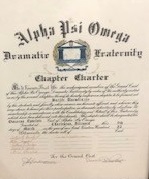Student Organizations
Butler University has a rich history of theatre related student organizations and dramatic honor societies on campus. Additionally, the predecessor institution to Jordan College of the Arts (JCA), the Jordan College of Music (JCM), and its own predecessor institutions also had their own drama organizations. One of these groups, the Jordan Players was incorporated into the University after the merger with JCM in 1951.
Many of these groups are described below, but other organizations at the University included Rido (reading, interpretation, dramatic art, and oratory; circa 1926-1929), which served as a stepping stone to Pi Epsilon Delta/National Collegiate Players, and the Dionysians (circa 1949-1952), among others.
Dramatic Club
In 1909, the Dramatic Club was organized at Butler University, one of the first student drama organizations directly associated with the University.
The number of students participating in the organization appears to have grown steadily. For the 1916-1917 school year, 37 students are listed as members and the director of their productions, F. Tarkington Baker, also taught a Friday evening course on modern drama circa 1915 to 1917.
The popularity of this group continued to grow even more when Rollo Anson Tallcott became the faculty sponsor of the group. Tallcott started as the University’s Professor of Public Speaking in 1921 and began teaching courses in dramatic reading and play reading. By the following year, Tallcott was listed in the University bulletin as working in the Public Speaking and Dramatic Art Department. He also started offering private instruction in other theatre related topics including stage directing and acting.
In order to participate in the Dramatic Club, students had to have participated in a selected number of productions. By 1920, interested students had to try out for the club and were judged for admission by club members and supervising faculty. Tallcott continued to oversee the Dramatic Club until he resigned at the end of the 1924-1925 school year. The organization was replaced by Pi Epsilon Delta/National Collegiate Players in 1925.
Pi Epsilon Delta/National Collegiate Players
In June 1922, Pi Epsilon Delta (founded at the University of Wisconsin in 1919) merged with the Associated University Players (founded at the University of Illinois in 1913), forming the National Collegiate Players, a national honorary dramatic organization.
On May 14, 1925, a local chapter of the organization was established at the University, primarily through the efforts of Professor Rollo Anson Tallcott, replacing the Dramatic Club. Only juniors and seniors who had participated in at least one play could be elected as members of the group. At the University, the organization is referred to somewhat interchangeably as Pi Epsilon Delta or the National Collegiate Players and appears to have existed on campus until 1932 or 1933.
Thespis
In 1927, another dramatic club, Thespis, was established and it proved to be one of the most successful theatre groups on campus. Named after the first Greek actor, Thespis was created as a starting point for students interested in becoming members of Pi Epsilon Delta/National Collegiate Players.
Initially, Thespis was open to students who had completed a successful tryout as well as coursework in the Public Speaking Department. Only after obtaining enough points from working on theatrical productions on campus could members join Pi Epsilon Delta/National Collegiate Players. However, in later years, membership was opened to all students in order to attract new members.
During its time at Butler University, Thespis was very successful. Using a basement room in Jordan Hall, referred to as the Thespis Workshop, the group performed numerous “noon-tide” plays that students, faculty, and staff could attend during their lunch break. They also performed off-campus productions such as those at the Little Theatre Playhouse on Alabama Street.
Additionally, the organization won national contests. The group’s production of Kenneth Sawyer Goodman’s Dust of the Road took first place at a national one-act play contest held at Northwestern University in April 1928. The contest was open to any bachelor degree granting university, college or normal school. The University competed against Carleton College, Minnesota; Southwestern College, Tennessee; Yankton College, South Dakota; Monmouth College, Illinois; Evansville College, Indiana; Berea College, Kentucky; Arkansas College; and the University of North Dakota. By winning the contest, the University was awarded the Cumnock Cup and $250.
The following year Thespis did not repeat their win with their production of The Marriage Gown, but principal actor Phyllis Nordstrom (Class of 1930) received the E. H. Sothern medal which was awarded to the best actor at the contest.
In 1933, Thespis also won a national radio play contest heard over the NBC Network in Chicago, defeating other schools including Illinois, Wisconsin, and Northwestern Universities; and they held weekly broadcasts in Indianapolis over Station WFBM. Thespis existed until circa 1943 when it may have been renamed Theater or University Theater, but little is known about the renamed organization.
Intermission
Intermission (sometimes written as INTERMISSION) was a short-lived Arthur Jordan Conservatory of Music (AJCM) (renamed Jordan College of Music (JCM) in 1949) honorary dramatic fraternity that existed from 1948 or 1949 until 1951. J. Thomas Adkins (JCM Class of 1950) was president of the organization during the 1948-1949 and 1949-1950 school years. He was later Chair of the Butler University Drama Department from 1962-1970.
Intermission continued into the 1950-1951 school year, but appears to have disappeared after the school’s merger with Butler University in 1951. According to the 1950 JCM Bulletin, "The Department of Drama and Speech sponsors a dramatic fraternity, known as 'Intermission.' The purpose of this fraternity is to acknowledge superior work for students in productions, as well as to fulfill a social and educational outlet for students in the dramatic field. 'Intermission' maintains its own student administrative panel and faculty advisor. Students are eligible for membership when they have participated in a sufficient number of shows and have acquired the necessary points” (p. 22).
Marguerite Carlson Adkins and James R. Phillippe served as the faculty advisors during the 1950-1951 school year. The organization held a “strike party” for the crew after the 1950 production of Arsenic and Old Lace, serving cider and doughnuts. Additionally, the group operated a coat check service and sold Cokes at each production given during the same school year. The 1951 production of the musical Who’ll Pay the Rent? proved to be so popular that both coauthor and composer James Lewallen (Class of 1950, M.M. 1952) and coauthor and lyricist Don Kelly (Class of 1951, M.M. 1952) were made honorary members of the group.
Butler Student Players
Organized in 1951 by faculty advisor Howard Grigsby, an Instructor in the Speech and Drama Department in the College of Liberal Arts of Butler University, the Butler Student Players was an amateur drama group that gave productions both on and off campus and was open to all Butler University students.
Their first production was The Male Animal in 1951. It was produced as theater-in-the-round and was sponsored by the Student Union organization. In May 1951, the group produced the play for a benefit at the Cold Springs Road Veterans Hospital. In addition, they performed the play at the Post Theatre at Camp Atterbury and then gave several performances of the play on campus in the Atherton Union cafeteria. The play was so popular that an encore presentation was planned.
The group produced 7 or 8 productions, all overseen by Grigsby. These productions included A Midsummer Night's Dream and Romeo and Juliet which were presented in Holcomb Gardens in 1952 and 1953 respectively. University administrators dissolved this group when they made personnel cuts in the Speech and Drama Department in an effort to center the focus of University theatre under the direction of the Jordan College of Music
Spotlighters/Alpha Phi Omega
In 1954, the Butler Student Players organized a dramatic honorary called Spotlighters. Points accrued from participation in theatrical productions, on and off stage, were required for membership. At that time, the organization had 21 members, and the faculty sponsor was James R. Phillippe. It was hoped the organization could be affiliated with a national organization.
There is little mention of the organization after 1955, and it was later replaced by the dramatic fraternity Alpha Phi Omega during the 1959-1960 school year. This organization existed on campus from the early 1960s until circa 1975. There is little information about this group on campus and it is unclear as to why this national service organization was selected over Alpha Psi Omega, a national theatre honorary organization.
Jordan Players/ Butler Players/Butler University Theatre
One of the first mentions of the Jordan Players in print is in the 1949 Opus, the Jordan College of Music (JCM) yearbook. According to the school's June 1950 Bulletin, the organization existed “To provide the student with opportunity for public appearance, the department offers at least four major productions each year. Tryouts for these productions are open to the student body of Jordan and preference is given to majors within the Department of Drama and Speech. Each production also carries its own Stage Manager, Setting, Lighting, Costume, and Properties Chairman, all of whom are students. In addition to these key positions on the production staffs, there is ample opportunity for students to work on the various crews of stage productions” (pp. 19-20).
At some point after JCM merged with Butler University in 1951, the name of the organization was changed to the Butler Players. Then, by the 1972-1973 school year, the name had been changed again to Butler University Theatre and it existed until the late 1970s or early 1980s. It is assumed that starting in the 1980s, the growing Drama Department took on more management responsibility over University productions, eliminating the need for a student organization to direct this work.
Alpha Psi Omega
Alpha Psi Omega became the primary student theatre organization in 1983. This group remains active to the present day and supports student projects and activities including hosting the annual "Black Box Awards" at the end of each school year, hosting opening night parties for productions, supporting student projects, and helping with carpools to local productions, etc. Fundraisers include an annual and popular "Halloween Costume Sale" open to the full campus. Students join APO by earning "points" by working on mainstage and student productions. In the 2022-2023 school year, APO returned to supporting ArtMix, a local non-profit.
Current student organizations
The current student organizations are Alpha Psi Omega and Sandbox Student Productions. For information on these groups, please visit the Department of Theatre website.
